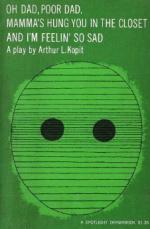|
This section contains 383 words (approx. 1 page at 400 words per page) |

|
Oh Dad, Poor Dad, Momma's Hung You in the Closet and I'm Feelin' So Sad Summary & Study Guide Description
Oh Dad, Poor Dad, Momma's Hung You in the Closet and I'm Feelin' So Sad Summary & Study Guide includes comprehensive information and analysis to help you understand the book. This study guide contains the following sections:
This detailed literature summary also contains Bibliography and a Free Quiz on Oh Dad, Poor Dad, Momma's Hung You in the Closet and I'm Feelin' So Sad by Arthur L. Kopit.
Arthur Kopit wrote Oh Dad, Poor Dad, Mamma's Hung You in the Closet and I'm Feelin' So Sad while he was studying European theater on a postgraduate travel scholarship earned at Harvard. His aim was to enter the work in a school playwriting contest, never anticipating that it would bring him worldwide acclaim at the age of twenty-three. As its subtitle indicated, he wrote the play as a parody "a pseudo-classical tragifarce in a bastard French tradition"in the new, avant garde French theater of Arthur Adamov, Eugene Ionesco, and Samuel Beckett. It was this subgenre of the theater that, in 1961, Martin Esslin labeled the Theatre of the Absurd.
Kopit's work won both the contest and an undergraduate production at Harvard. The play created such a stir that it was moved into a Cambridge, Massachusetts, commercial house, the Agassiz Theater, where it garnered very positive reviews. The favorable notices attracted the attention of the Phoenix Theatre in New York, a major Off-Broadway house that staged alternative theater works. The play opened there on February 26,1962, running for 454 performances, an extraordinary achievement for an unknown playwright with no previous New York production credits. The work also won both the Vernon Rice and the Outer Circle Awards.
The offbeat, dysfunctional charactersespecially Madame Rosepettle and her son, Jonathan caused some critics to complain about a lack of serious purpose in the play as well as its derivative elements, but the farcical and fanciful treatment of an overly-protective, domineering mother and her neurotic son gave New York and European audiences little pause. Most commentators could not argue with success and found the play a engaging spoof of everything from Tennessee Williams's Rose Tattoo to Freudian psychology.
Although Kopit, like Edward Albee (Who's Afraid of Virginia Woolf?), was initially tagged an absurdist, his subsequent work showed him to be capable of a wide variety of theatrical styles. A careful craftsman, over his career he has experimented widely with both form and content, establishing himself as one of the most diverse and innovative playwrights that America has produced. Oh Dad remains a psychedelic romp, a popular chestnut for small theaters and repertory groups both at home and abroad. It can be argued that the play's characters lack psychological complexity but most viewers agree that they are unforgettable.
Read more from the Study Guide
|
This section contains 383 words (approx. 1 page at 400 words per page) |

|



